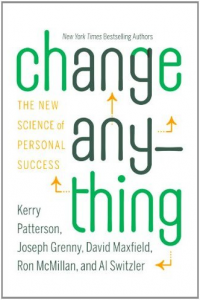 Ever since 1997 I've closed my live "How To Own Your Paycheck Again!" workshops by suggesting to the students that if they needed motivation to get out of debt they should visit Walmart after midnight and take notice of the people working the checkout counters.
Ever since 1997 I've closed my live "How To Own Your Paycheck Again!" workshops by suggesting to the students that if they needed motivation to get out of debt they should visit Walmart after midnight and take notice of the people working the checkout counters.
My point being that the people working at that hour tend to skew older and probably NEED to be there rather than WANT to be there. My assumption is that their financial choices when they were younger were what lead to their current employment situation.
Little did I know that I was encouraging people to visit their "default future", a term I was introduced to last weekend in a book called "Change Anything".
"Visit your default future" is one of the five tactics for "turning our future into an ally for change."
From the book...
Your default future is the life you'll live if you continue behaving as you currently are. It's the life that's hurtling toward you-but you aren't motivated by it because you aren't currently in it.
With a little imagination you can pull that unpleasant future forward and wire it into your current decision making. One powerful way to do this is to take a field trip to yourfuture. An actual experience like this can profoundly reshape your feelings about your choices when the pep talks and guilt trips you've tried in the past have had no effect.
For instance, when it comes to your finances, think back to a visit you recently may have made to an acquaintance who is currently living on nothing more than Social Security and is suffering as a result. That could be you. Or calculate what you'll have to live on after retirement if you continue your current spending and saving patterns- and then try to live on that much for a month. Visit your future self: Taste your future meal, lounge in your future furniture and sit in your future car. The experience just may change your life.
Our inability to see our future is particularly troubling when certain aspects aren't guaranteed to happen - but will have cataclysmic consequences if they do. Under these circumstances, it can be even more important to personally examine what might happen to you - on a bad day.
Tough talk huh? But hard to argue with.
Spend a moment considering where your default future is if things don't change. It could be in areas of your finances, health, relationships or addictions.
I absolutely love this book. The reviews on
Amazon are stellar and I've already started incorporating it's strategies in my own life.
 Ever since 1997 I've closed my live "How To Own Your Paycheck Again!" workshops by suggesting to the students that if they needed motivation to get out of debt they should visit Walmart after midnight and take notice of the people working the checkout counters.
Ever since 1997 I've closed my live "How To Own Your Paycheck Again!" workshops by suggesting to the students that if they needed motivation to get out of debt they should visit Walmart after midnight and take notice of the people working the checkout counters.
I love your book selections! Thanks for this tip; I will check out the book on Amazon. Add me to your “changers” group.
Excellent-thought provoking-move you into action insight.
Wow! Try stepping into your future. We all need to do that to shake us into planning for the future.
If one spouse is a spender and the other is a saver/planner, the spender needs to try this “living a day in your future” idea out.
Thanks Leo for sharing this. I will have to check out the book too.
Count me in for the discussion group.
I have been looking for just such a book. I appreciate the suggestion. I have not read reviews for a book on Amazon where all reviews were five stars.
Please add me to your “changers” group.
The book sounds great..I just ordered it! Please add me to the “changers” group. If more people would really do that, and look into their “default future”..they would probably be motivated to change. I liked the example of the employees working late nights at Walmart.
Love the P.S. in your latest e-mail update:
“If you think nobody cares if you’re alive,
try missing a couple payments.” Funny but true.
Also love “Social Motivation” idea you mentioned …………”wouldn’t it be great if every time we made a charge on
our credit cards a bunch of our friends got an email
with how much we charged and to whom? We sure would
be more careful about our spending.”
Nice way to use social influence to curb the credit card spending or any other problem spending one could be plagued with.
Keep sharing Leo and thanks.
This book sounds very interesting. Thanks for sharing with us. Would be delighted to join a discussion group.
Am interested in your “changers” group. Keep me informed please.
Leo,
Thanks for sharing this. After reading this over a week ago I got the book and read it on my Kindle. I love it and have already made an important change to my behavior. The default future was key in making this change. I know I’m not out of the woods yet as some research suggests it can take six to nine months to make a change automatic. So I’m keeping my guard up until then. Also, I’d like to join your group of changers. Are you creating such a group on the changeanything.com website?